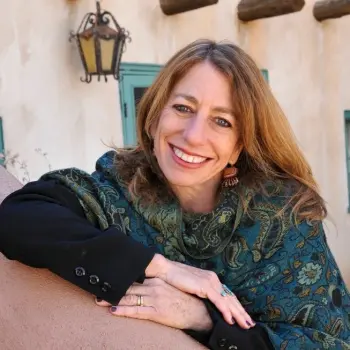Do you live life in touch with your innermost feelings—or do you live strictly through your head, letting your mind call the shots? If you’ve been feeling a bit adrift lately, either empty, down or directionless, you may have lost touch with a vital part of your self—the soul.
The first thing to do is recognize the soul, what it is and the role it plays in your life.
I like to think of the body as a figurative home. Our spirits, the fanciful part of ourselves that dreams, imagines and creates, lives in the well-lit attic. But our soul, the deepest part of our inner being, resides in the dimly lit basement. Like any basement, it also includes the foundation, the one on which our lives are built.
In a recent issue of The NY Times Magazine, the spiritual leader Ram Dass pointed out that we often ignore the soul because we are entranced by the nonstop stream of thoughts entering our head. These thoughts engage the ego and until we stop long enough to break away from them, we don’t recognize the soul. That’s important, because it keeps us from the better part of ourselves. In his words:
The soul contains love, compassion, wisdom, peace and joy, but most people identify with the mind. You’re not an ego. You’re a soul.
We ignore the soul to our own detriment. David Brooks, writing in the The Second Mountain, reminds us that while powerful, the soul “is also reclusive. You can go years without really feeling the force of its yearning. But eventually the soul hunts you down.”
Your life may be full and active with a never quite finished to-do list, but this busyness is not what the soul wants. If you are not satisfying the needs of the soul, Brooks tells us “there are spare moments when you vaguely or even urgently feel her presence.” It can happen during a sleepless night, or even on a crowded street, when a vast hole in the center of your being makes itself known.
What does your soul want from you? Our souls are all different so the answer varies from person to person. But in general, Brooks says that:
The soul yearns for righteousness, for fusion with the good. Socrates said that the purpose of life is the perfection of our souls—to realize the goodness that the soul longs for. The soul demands your justification. What good have you served? For what did you come? What sort of person have you become?
Brooks says that in our modern world, we are too often caught up in the wants of the ego, the desire to “be in control” or to “impress the world.” This is not what the soul, “the deeper self underneath,” wants from us. He writes:
Achievement, intelligence, the need for recognition, are wants of the ego. They do not fulfill the needs of the soul, which is aligned with the deepest yearnings of the heart and the pursuit of fulfillment and joy.
Writing in Original Self, Living with Paradox and Originality, Thomas Moore digs a little deeper into the wants of the soul. As he has shown in a dozen books on the subject, Moore has seemingly intuited the inner workings of the soul and what makes us tick. He points out that:
The soul has its own set of rules, which are not the same as those of life. Unlike the steady progress of history, the events of the soul are cyclic and repetitive. Familiar themes come round and round. The past is more important than the future. The living and dead have equal roles. Emotions and the sense of meaning are paramount. Pleasures are deep, and pain can reach the very foundations of our existence.
In a sentiment echoed by both Ram Dass and David Brooks, Moore also fears that we have lost touch with our souls, our lives “getting lost in the busyness of the world.” When the soul cries out for attention, we misdiagnose what we are feeling:
Today many people live the external life exclusively, and when the inner world erupts or stirs, they rush to a therapist or druggist for help. Often they have no idea what is happening, because they have been so cut off by the deep self. Their own soul is so alien to them that they are unaware of what is going on outside the known realm of fact.
How do we find and connect with the soul? Moore points out that in the past, before technology came to dominate our waking lives, we had ways to connect:
Former methods of keeping in touch with the inner life have gone out of mode. Diaries, letters, and deep conversation help focus attention on developments and materials that lie beneath the surface. Only 100 years ago, people kept elaborate and detailed diaries and notebooks. We seem to have left behind these methods of reflection.
What can we do today to engage the soul and hear its yearnings?
Moore advises us that the key to cultivating a rich internal life is to “simplify the externals.” In his words:
For many, turning off the TV would be an act of simplifying that might have magical results. Staying home, instead of going out, can work magic. Not buying something, not going somewhere, and not endlessly watching our phones can each be an effective application of the simplicity rule.
There’s a phrase we use in my home called “hunkering down,” as in we’re hunkering down this weekend. That means avoiding social engagements, dimming the lights, enjoying a home cooked meal and bottle of wine, limiting the use of our phones. Hunkering down can also mean spending time in nature, walking a beach or a tree-lined neighborhood. These quiet moments, breaks from the busyness of life, give us the time needed for contemplation and reflection. We might ask ourselves:
Where is my life headed? Am I following my passions? What am I yearning for? Do I need to make any course corrections to put my life on a different path?
Moore says that if we have not always been smart about the decisions we’ve made in the past, solely using our intellect to make important life choices, it may make sense to follow the lead of our souls:
We may allow our decisions to rise from a deeper place, a place lower than rationale intelligence….using our interests, intuition and even divination. Doing the prudent thing may prevent us from following our passions. It may overrun our intuitions and may give us the illusion of being virtuous when life is asking us to explore territory lying beneath the horizon.
Ask yourself: What is the soul asking of me?
Note: I have lightly edited the passages from Brooks and Moore, changing a few words but not the intent of their message.


















